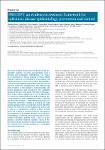PRECEPT: an evidence assessment framework for infectious disease epidemiology, prevention and control
Harder, Thomas
Takla, Anja
Eckmanns, Tim
Ellis, Simon
Forland, Frode
James, Roberta
Meerpohl, Joerg J.
Morgan, Antony
Rehfuess, Eva
Schünemann, Holger
Zuiderent-Jerak, Teun
Gomes, Helena de Carvalho
Wichmann, Ole
Decisions in public health should be based on the best available evidence, reviewed and appraised using a rigorous and transparent methodology. The Project on a Framework for Rating Evidence in Public Health (PRECEPT) defined a methodology for evaluating and grading evidence in infectious disease epidemiology, prevention and control that takes different domains and question types into consideration. The methodology rates evidence in four domains: disease burden, risk factors, diagnostics and intervention. The framework guiding it has four steps going from overarching questions to an evidence statement. In step 1, approaches for identifying relevant key areas and developing specific questions to guide systematic evidence searches are described. In step 2, methodological guidance for conducting systematic reviews is provided; 15 study quality appraisal tools are proposed and an algorithm is given for matching a given study design with a tool. In step 3, a standardised evidence-grading scheme using the Grading of Recommendations Assessment, Development and Evaluation Working Group (GRADE) methodology is provided, whereby findings are documented in evidence profiles. Step 4 consists of preparing a narrative evidence summary. Users of this framework should be able to evaluate and grade scientific evidence from the four domains in a transparent and reproducible way.
No license information

